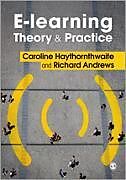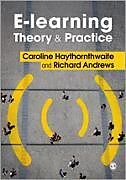E-learning Theory and Practice
Einband:
Kartonierter Einband
EAN:
9781849204712
Untertitel:
Englisch
Autor:
Caroline Haythornthwaite, Richard Andrews
Herausgeber:
SAGE Publications Ltd
Anzahl Seiten:
274
Erscheinungsdatum:
2011
ISBN:
1849204713
Experts in the field set out new paradigms of learning, making this text a must-read for all those involved with e-learning - inlcuding educators, researchers and graduate students
Informationen zum Autor Areas of Research Computer-mediated communication (CMC) and the Internet; information exchange via CMC; online communities; e-learning; social network analysis; collaboration; social informatics; community informatics I focus on research in the fields of language education, argumentation, writing development, multimodality, rhetoric and e-learning. With colleagues I designed the MA in English Education. Klappentext Experts in the field set out new paradigms of learning, making this text a must-read for all those involved with e-learning - inlcuding educators, researchers and graduate students Zusammenfassung Experts in the field set out new paradigms of learning! making this text a must-read for all those involved with e-learning - inlcuding educators! researchers and graduate students Inhaltsverzeichnis Acknowledgements Introduction: New Learning Practices What s New in Learning? What is Driving New Conditions for Learning? Chapter Outline Looking Forward Further Reading The New Media Introduction Features of Computer-Mediated Communication Conclusion Further Reading Theories of Learning Introduction Transformation, Framing and Emergence Challenges for Assessment Toward E-Learning Theory Texts Conclusion Further Reading Theorizing Online Learning Introduction Existing Theoretical Positions Further Theories Interim Summary Does E-Learning Require a New Theory of Learning? Three Questions Answered Further Thoughts Conclusion Further Reading New Literacies, New Discourses in E-learning From New Literacies to New Discourses Exploring Modes From Literacy to Discourse The Implications of a Discourse View of E-Learning A Reciprocal, Co-Evolutionary Model of Literacy Development and Learning Developing a New Language for E-Learning Conclusion Further Reading Participatory Cultures Introduction Technologies of Participation Brief History of IT Development Participatory Media Educational Spaces: 1.0 and 2.0 Changes in Authority and Contribution Conclusion Further Reading Learning Communities Introduction Defining and Locating Community Why Collaboration and Community? The Concept of Community Creating an E-learning Community Promoting a Community Conclusion Further Reading Sociotechnical Perspectives Introduction Reviewing Social Processes and Technology Managing the Social and Technical Mix in E-learning Balancing the Social and Technical Conclusion Further Reading E-learning Ecologies Introduction The Ecology of the E-learning Environment Personal Ecologies Conclusion Further Reading Ubiquitous Learning, Ubiquitous Learners Introduction Becoming an Ubiquitous E-learner Who Is A Ubiquitous E-learner? What Does a Ubiquitous Learner Learn? The Ubiquitous Learner and the Economics of Attention Conclusion Further Reading E-inclusion and Exclusion Introduction Digital Divide Digital Spectrum Conclusion Further Reading Cross-Cultural Issues Introduction Issues Arising From Cultural Diversity E-learning Across the Globe Potential Problems with Cross-Cultural Approaches to E-Learning Further Reading Researching E-Learning Introduction Getting Started in E-Learning Research E-learning Research Dimensions Research about and for E-learning New Forms of Research Formats in the Digital Age Becoming an E-Researcher Future Research From Research About E-Learning to Research For E-Learning Conclusions Further Reading References ...
Autorentext
Areas of Research
Computer-mediated communication (CMC) and the Internet; information exchange via CMC; online communities; e-learning; social network analysis; collaboration; social informatics; community informaticsI focus on research in the fields of language education, argumentation, writing development, multimodality, rhetoric and e-learning. With colleagues I designed the MA in English Education.
Inhalt
Acknowledgements
Introduction: New Learning Practices
What s New in Learning?
What is Driving New Conditions for Learning?
Chapter Outline
Looking Forward
Further Reading
The New Media
Introduction
Features of Computer-Mediated Communication
Conclusion
Further Reading
Theories of Learning
Introduction
Transformation, Framing and Emergence
Challenges for Assessment
Toward E-Learning Theory
Texts
Conclusion
Further Reading
Theorizing Online Learning
Introduction
Existing Theoretical Positions
Further Theories
Interim Summary
Does E-Learning Require a New Theory of Learning?
Three Questions Answered
Further Thoughts
Conclusion
Further Reading
New Literacies, New Discourses in E-learning
From New Literacies to New Discourses
Exploring Modes
From Literacy to Discourse
The Implications of a Discourse View of E-Learning
A Reciprocal, Co-Evolutionary Model of Literacy Development and Learning
Developing a New Language for E-Learning
Conclusion
Further Reading
Participatory Cultures
Introduction
Technologies of Participation
Brief History of IT Development
Participatory Media
Educational Spaces: 1.0 and 2.0
Changes in Authority and Contribution
Conclusion
Further Reading
Learning Communities
Introduction
Defining and Locating Community
Why Collaboration and Community?
The Concept of Community
Creating an E-learning Community
Promoting a Community
Conclusion
Further Reading
Sociotechnical Perspectives
Introduction
Reviewing Social Processes and Technology
Managing the Social and Technical Mix in E-learning
Balancing the Social and Technical
Conclusion
Further Reading
E-learning Ecologies
Introduction
The Ecology of the E-learning Environment
Personal Ecologies
Conclusion
Further Reading
Ubiquitous Learning, Ubiquitous Learners
Introduction
Becoming an Ubiquitous E-learner
Who Is A Ubiquitous E-learner?
What Does a Ubiquitous Learner Learn?
The Ubiquitous Learner and the Economics of Attention
Conclusion
Further Reading
E-inclusion and Exclusion
Introduction
Digital Divide
Digital Spectrum
Conclusion
Further Reading
Cross-Cultural Issues
Introduction
Issues Arising From Cultural Diversity
E-learning Across the Globe
Potential Problems with Cross-Cultural Approaches to E-Learning
Further Reading
Researching E-Learning
Introduction
Getting Started in E-Learning Research
E-learning Research Dimensions
Research about and for E-learning
New Forms of Research Formats in the Digital Age
Becoming an E-Researcher
Future Research
From Research About E-Learning to Research For E-Learning
Conclusions
Further Reading
References

Leider konnten wir für diesen Artikel keine Preise ermitteln ...
billigbuch.ch sucht jetzt für Sie die besten Angebote ...
Die aktuellen Verkaufspreise von 6 Onlineshops werden in Realtime abgefragt.
Sie können das gewünschte Produkt anschliessend direkt beim Anbieter Ihrer Wahl bestellen.
Loading...
Die aktuellen Verkaufspreise von 6 Onlineshops werden in Realtime abgefragt.
Sie können das gewünschte Produkt anschliessend direkt beim Anbieter Ihrer Wahl bestellen.
| # | Onlineshop | Preis CHF | Versand CHF | Total CHF | ||
|---|---|---|---|---|---|---|
| 1 | Seller | 0.00 | 0.00 | 0.00 |
